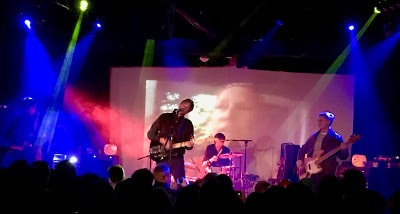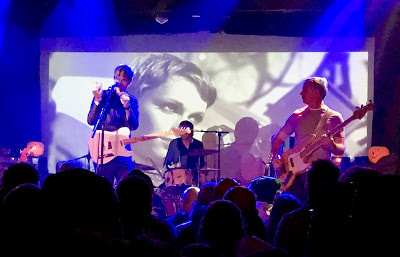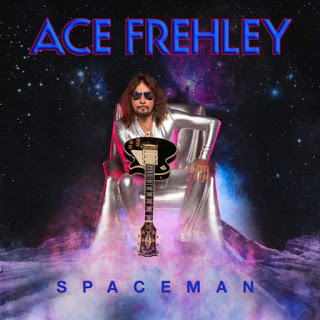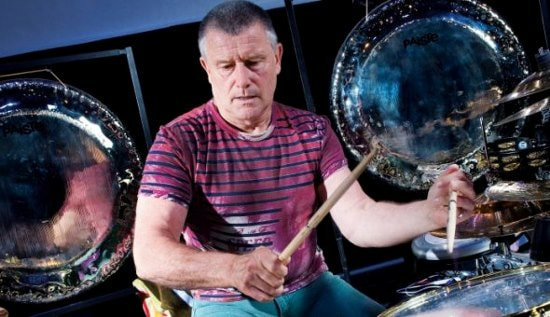|
Concert review by Eric Sandberg with photos by Michael Berman The Ocean Blue The Echoplex, Los Angeles, CA October 28, 2018 In my capacity as a buyer for an LA based retail music chain in the late 80s and early 90s, a lot of promo CDs landed on my desk. If you've ever dug through the $1 CD bins in your local cool record store, you've seen most of them. Toad The Wet Sprocket, Spin Doctors, Bush, Creed, Limp Bizkit, Spice Girls, Hanson, Ace Of Base, Savage Garden, The Offspring, Everclear, The Presidents of the United States of America, Smash Mouth...the end is listless. Of all the hundreds of CDs that I received only a handful made it into my music collection and remain there to this day. There's The Odds, Jimmie Dale Gilmore, Collective Soul (actually they're really good) and The Ocean Blue. From the first moment in 1989 that I heard the shimmering, single-note guitar riff of "Between Something And Nothing" followed by the soft, charming voice of frontman David Schelzel, I knew that the debut album by The Ocean Blue was a keeper. Their music was simple, melodic and very English sounding despite the band hailing from Hershey PA. Two more even better albums were released on the Sire label, followed by one more excellent record with Mercury, the latter introducing new, key sideman Oed Ronne. Following the Mercury album The Ocean Blue vanished, along with the retail music industry. I found myself working at Toys R Us and still listening to those four albums regularly. It wasn't until the rise of the internet that I discovered The Ocean Blue had self-released a fifth album Davy Jone's Locker in 1999. They picked up right where they left off - creating music that makes me happy. A terrific EP, Waterworks followed five years later and it was another nine years before The Ocean Blue released perhaps their best ever album Ultramarine featuring such gorgeous slabs as "New York 6AM" which garnered extensive airplay, at least on KCRW here in LA. As someone who has seen more than his fair share of bands and artists that ended up owing their labels money rather than getting rich, I often wonder what became of these people. I know a guy who was the guitarist in a one and done major label band who has been working at Amoeba Records in Hollywood for decades. I know another one who was a sideman for one of the biggest artists of all time and was working at Guitar Center when I met him. David Schelzel, lead singer, guitarist and main songwriter for The Ocean Blue is a successful lawyer, specializing in entertainment copyright law. Oed Ronne is a talented artist and runs a graphic design studio. They got on with their lives after those heady major label days and made a living for themselves. Thankfully, the band is just too good to be let go of entirely and, despite some of the members living in different time zones, they manage to clear their schedules every once and a while to record new songs and go on tour. Based on the crowd that packed into the Echoplex on Sunset Blvd last Sunday night, they have enough of a following to make touring a worthwhile endeavor. I was extremely excited for the opportunity to see a band I have loved for decades. I prepared myself that they might look old, fat and bald...like I do, but they clearly take better care of themselves. David Schelzel must have a hyperbaric chamber (or a coffin) in his basement because he still looks like the same Ivy league freshman that appears in the early album photos. "
His voice has matured and deepened slightly since those records were recorded but it still possesses the same tonal charm that endeared me to him all those years ago. The playing was tight - the songs aren't rocket science but they sure are catchy and memorable. I had no sense of time as David Schelzel, keyboardist/guitarist Oed Ronne, founding bassist Bobby Mittan and relatively new drummer Peter Anderson plowed through a twenty-two song set, including three new songs which will appear, with any luck, on a new album in 2019 according to Schelzel. With the exception of "New York 6AM", the band played every song I and the enthusiastic and surprisingly knowledgeable crowd could hope for. As I found myself much farther from the stage than I would like, I realized that I no longer had this relatively obscure band to myself.
2 Comments
Tongue in cheek album review by Eric Sandberg The Humble Intellectual ew are privy to the true identity of Ace Frehley, who at a young age donned grease paint, a space suit and a guitar to form Kiss, a high concept group of musicians on a quest to merge rock music with Japanese Kabuki theater.
Quiet rumors persist that Frehley, in his true identity, had already graduated from Harvard and Julliard simultaneously by the time he joined Kiss. Frehley left the group over differences held with singer Paul Stanley on socioeconomic status and adiposity in childhood, a subtle parting of the ways I will not detail in this review. Ace briefly reunited with Kiss in the 2000s but Frehley's longstanding dispute with drummer Peter Criss, over whether emotive significance is a matter of degree or kind, nearly led to a tea biscuit being lobbed by one at the other and they were both once again expelled from the band. In 2009 Frehley released Anomaly, the first in a proposed trilogy of high concept albums that are intended to cover all aspects of Religion, Philosophy and Science. But now, Frehley has pundits and fans scratching their collective heads as Ace has just dropped a new, thinly veiled concept album titled Spaceman. The concepts and themes that appear in this record have us wondering if this is part two of the promised trilogy or a side foray into such varied subjects as gender roles, self-identification with geographic upbringing and the rise of Authoritarianism. For example, with "Rockin' With The Boys" Frehley sings "Don't be sad, girl, I'm rockin' with the boys," and turns the modern idiom of gender role-reversal on it's ear by having the female sit at home pining while the male earns a living for them both by "rockin' with the boys." It's a twist that is so subtle and ingenious that it may be lost on the casual listener. Frehley, cleverly plays his guitar in a purposefully minimalist manner on this track leaving the listener pondering whether the song's protagonist could possibly earn a living for two people rockin' with the boys. In "Bronx Boy" Frehley ponders whether being raised in the Bronx affected his intellectual development. "I never played with toys, don't give me your bullshit" tacitly implies Frehley's concerns about the rise of Authoritarianism in America, while "The Pursuit of Rock and Roll" provides dim hope that we will move past the current political climate. "I want life, liberty and the pursuit of rock and roll' Frehley shouts, more than sings, again playing his guitar in such a way that suggests he has not practiced in forty-five years, a canny conceit asserting that we as a nation have lost our collective drive to improve ourselves. It is that ability to subsume his prodigious musicianship and reduce complex socio-political concepts to, what appears on the surface to be utter piddle that makes Ace Frehley a national treasure. Ace Frehley — Spaceman Entertainment One Music www.acefrehley.com Album review by Eric Sandberg For people who continually decry the evils of Twitter, I say "But for Twitter I would never have 'met' Henning Ohlenbusch." As I recall, the Northhampton, MA based guitarist with The Fawns followed me on Twitter after reading some of my pithy replies to Robyn Hitchcock tweets.
I checked him out, of course, because he seemed to be one of my few followers that isn't a Russian bot. Henning is fun on Twitter thanks to a whimsical sense of humor, wildlife-spotting reports and a series of Fan Challenges where he poses interesting questions about popular music and requests responses in the form of a retweet. In the Fawns, Henning is a sideman, supporting his significant other Lesa Bezo, who fronts that band and writes all of the material; but Henning is a prolific songwriter and bandleader himself. Henning formed School For The Dead, which released two albums before changing their name to Gentle Hen. As Henning puts it "Hey, let's change our name after being a band for so long and releasing a few albums. It'll make it harder for people to find us." The earlier albums by the band, under either name, evoke a jangly, indie, Eastern North Carolina feeling. Each album exhibits an advancement in songwriting, arranging and playing that leads us to the third Gentle Hen album which sees them ready to gain some real traction in this "tsunami" we currently call the music business...only if enough people get to hear it. Be Nice To Everyone begins with the bold statement "We've Got The Goods" a driving power-popper, crisply played and confidently sung. The remaining ten tracks ably back up that assertion. "She's Got It Bad" is replete with a classy keyboard intro leading to some tasty 12-string jangle, establishing Gentle Hen as the anti-Weezer. Henning's somewhat nasal voice adds authentic charm to the whimsical lyrics and are sung with such expert and earnest phrasing that his non-traditional voice is an asset rather than a hindrance to your listening pleasure. The stomping albeit filler track "Knock Knock Knock" is followed by the grooving synth riff of "This Could Only Happen To You," which plows along with insistent vocals and an oriental set of guitar dyads that act as counterpoint to the keyboard riff. But everything so far is just a feint to get you to track five -- "A Few More Lifetimes" -- the album's literal and figurative centerpiece. This beautiful, haunting ballad is perfectly arranged, with ethereal pedal steel work from guest musician Andrew Goulet, as well as swirling organ and a tasteful, echo-drenched guitar solo. I find myself often hitting the forward button to skip the musically trite TMGB send-up "There's A World In The World" to get to the absolutely delicious slice of power pop titled "Lean And Catch Your Fall," a song as good as or better than anything by Paul Westerberg, Matthew Sweet, or Alex Chilton for that matter. If Henning Ohlenbusch can keep writing gorgeous songs like this, I say let's send the penchant for musical whimsy on holiday for a fortnight. Once again my finger is poised over the skip button as "They Know, They Know" hums along. It's another nice little ditty that recalls the band's past work, but it stands in the way of me listening to "Ancient Bones," in which Gentle Hen merges John Lennon, Robyn Hitchcock and, dare I say, Porcupine Tree into one brilliant, anthemic pop song that once and for all proves that this band has the goods. While "Ancient Bones" is a clear show closer, the final two tracks serve well as an encore. "You Can Take It Back" recalls the early Attractions with a fast punk beat driving some two-fingered Wurlitzer chords, just to shake you out of the blissful trance induced by its predecessor. The album closes with the hopeful "What We Did And What We Didn't Do," a catchy, upbeat reflection on how to live your life (be nice to everyone) with a great middle-eight that lends some heft to the bouncy verses. Be Nice To Everyone is thoroughly enjoyable throughout. The less substantial songs, really just additions to the style established on previous albums, are quite good and listenable, but are somewhat exposed by the tremendous leap forward in songs like "A Few More Lifetimes," "Lean And Catch Your Fall," and "Ancient Bones." Those songs hint at a songwriter who is ready to make a big impact -- if enough people get to hear this fine record. Gentle Hen — Be Nice To Everyone Rub Wrongways Records @GentleHen @ItsMeHenning CRR archive interview by Eric Sandberg — Carl Palmer Carl Palmer needs no introduction. If you need me to detail Carl's vast contributions to music during a five decade career of uncompromising excellence at his craft, you shouldn't even be reading this. I caught Mr. Palmer for a brief chat as he prepared to head to the next town for the next sold out date of his successful ELP Legacy tour, promoting their most recent live album and DVD, featuring metalized guitar, bass and drum instrumental arrangements of ELP classics. Eric: You're about to wind up the American leg of the ELP Legacy tour promoting your great new live album and I see you have dates coming up in Europe in the new year. Now that the album has been out for a while, how are you feeling about the reception it's getting? Carl Palmer: The reviews we've had have been really good. It's on the same label (BMG) as the entire ELP catalog. I'm signed directly to them as well. The DVD is a tribute to Keith and Greg. It was recorded eighteen months ago and was originally intended as a tribute to Keith Emerson but, within the year, Greg Lake passed away as well, so we postponed the release and added a tribute to him. The CD is also live and features some new classical adaptations, some new ELP and King Crimson classics and that's packaged with the DVD as well. As I said, the reviews have gone well and the concerts are going great, we've had quite a few sellouts on the tour. All in all I'm very, very pleased. Eric: I'm of a certain age where I grew up listening to so many wonderful bands from the late 60s and 70s like Emerson, Lake & Palmer and Yes. In this day of the internet, we learn instantly when one of our heroes has passed away and it's tough. As a musician and bandmate, you have had a particularly trying time in the past year with the passing of three very important people in your life. I can't imagine what that has been like for you. CP: It's been quite hard. You don't often have a career that has that type of problem where you lose three people in such a short time. In actual fact, the three were lost in a period of eleven months. Keith passed in March, 2016, then Greg in December and John Wetton in January of 2017. These were friends, people with whom I've made a lot of music, toured the world and been very successful. To lose three in such a short period is probably a first. I don't think anyone in our business has actually gone through that. Eric: We are certainly grateful that you are still with us, healthy, and still able to perform behind the kit at the same impeccable level. Bill Bruford and Neil Peart have retired and Phil Collins is sitting on a stool, but it's not a drum stool. I have to ask you how you are able to do it when so many of your contemporaries in the field of percussion have been forced to sheath their sticks because of the pain they are in. CP: All the people you mentioned have what I call ergonomical problems caused by the way their drums were set up. They had inherent problems for many years because of the way they played. I'm not saying it's relevant to all of them but I think this is relevant to Phil and Neil in particular. I've had some great teachers. I've had as many as six teachers and one of them was an unbelievable instructor. The first thing he did was show me how to set up a drum kit. I don't think many people are ever taught how to set up a drum kit properly. They get a drum set and they just start playing it. You see all these weird angles where the player looks like he's sitting on the floor and the cymbals are tilted at a forty-five degree angle. All of that contributes to problems which will crop up in the future if you play for many, many years. So that has something to do with it. I'm also very strict with my diet. I'm a Vegan and I've never really drank...I've never had a beer, for example, and I never smoked cigarettes. I've done a few drugs in my lifetime when I was young. You may know I was in a band called The Crazy World of Arthur Brown in 1968. We had the number one single with "Fire." You can imagine being a part of that period of psychedelia, Haight-Ashbury and all that, but none of that really appealed to me. I was only there for the music, I wasn't even there for the fame. I was into the music and if money came along, and I could make a living...which I have for many years now...that feels fine. So that's how it all came about and that's who I am. All of those things put together; looking after yourself, eating well, setting up your drums properly so you don't have problems...I think all of that's got something to do with it. I've had both my hands operated on for carpel tunnel but it was nothing at all to do to do with drumming, believe it or not, it had to do with Karate which I've practiced for the last eighteen years. I realized I had to stop because I was getting a little bit older and drumming was more important to me, so I stopped going down to the dojo to train. So I've had my problems but they haven't been severe because they've been controlled. Eric: I think one word that can all can sum all that up is discipline. I actually spoke with a former bandmate of yours yesterday, Robert Berry. He says hello and wants you to know how impressed he is with your work with Carl Palmer's ELP Legacy and how you are as good as you've ever been, but he also talked about how disciplined you were when it came to managing the day to day business of being a recording and touring musician. CP: I know Robert very well and what he said is absolutely true. I've always played a big part in the business because I've learned quite a lot. I had my first success when I was eighteen years old and I've paid attention as things have gone along and it's been very good for me. I'm very happy for all of that. Eric: I'd like to take a moment to ask you about another massively successful band you were in, Asia. You fulfilled a number of tour dates, obviously, with Billy Sherwood stepping in, but are there any future plans for Asia after the passing of John Wetton? CP: Yes there are. I can't really tell you everything right now because we're still in talks. Who knows, this could happen by next summer. There is nothing in concrete, if it happens I'll still be playing with CPL but Asia could be part of the bill. It's something that Geoff and I have discussed and it's a question of fitting it around with what I do and what he does. That's all I can tell you at this time. Obviously, my first priority is CPL and don't forget that in 2020 there are a lot plans surrounding the fiftieth anniversary of ELP. I'm trying now to put something together with my band and other outside artists so we can actually put on a concert to be filmed or broadcast. That's one of my main priorities right now. Asia is still there, it was a great band, but it is not one of my priorities right now. If it all comes to work out, that's fine, but I've got plenty of other things going on. Eric: For this proposed ELP 50th anniversary concert with your band and other outside artists, are you planning to incorporate vocalists and other instruments? CP: Yes, absolutely. We still do have a number of vocals that we use with CLP. There are some things we have been doing this year with Paul (Bielatowicz) on vocoder. So other artists will be brought in to augment the band and this will include singers. The BMG roster of musicians is very broad in the point of view of different kinds of musicality, so there are a lot of people we could use that would be from the same label. It's just a case of approaching them and building things up so we have something worthy of a global concert. Eric: With everything else going on in your life and career, how have you also had the time to establish a career as a graphic artist? CP: I have various people working for me in that area. It's been quite successful. I engage a company called Scene Four in Los Angeles so it's not a problem managing it. I have to find the time to focus on ideas. I have put out two catalogs, the first being Twist Of The Wrist and the second is The Rhythm Of Light. They've both sold exceptionally well and we do hold art events in which I participate. The actual creating of the art is the most time consuming part of it for me. One canvas can take seven or eight hours, if I'm lucky, and I can also spend that amount of time and come up with nothing. What I'm doing at the moment is kind of a hit and miss art form. I'm basically capturing light from the end of drumsticks which have LED lights built into them. There is a red, green, yellow and a blue. They don't go out when I'm playing the drums. They're self-generating and indestructible. I'm set up in the other room about twelve feet by twelve feet in pitch black with two two digital cameras set at different shutter speeds and we try to find the right angles for these cameras to be placed until something works. And then it's down to the synergy between me and person operating the camera on that day. If he pushes the buttons at the right time as I drum, we're going to get an image that can be something quite magical, something that can't be reproduced. So when we get one it's like writing a song or a piece of music. It's something that has been given to you, you take it and you move on. It can be quite an involved process but I'm very happy to be doing it. I started creating art back in 1973, before we had all this technology, which has created a new art form which we have now. Eric: So, looking ahead to 2019 you have a twenty or so date tour booked already in February and March. Do you think you will be coming back to the United States at all? CP: We might be back late in the year. It's a little bit up in the air at the moment, we haven't been able to lock it all down, but we definitely will be going to South America next year. We're going to be doing some recording with an orchestra in Argentina and we are going to start our own Summer camp which will take place in the Philadelphia area (see link). It will be a two day event. Paul and Simon (Fitzpatrick) will be there, along with me, teaching classes. We will have other outside instructors and there will be a concert along with a screening of some ELP footage that has never been seen. Eric: Well you've certainly got all of us fans excited for the next two years. I hope you've booked some holiday time for yourself. Does it ever become daunting to have your life booked out over a matter of years? CP: I'm very fortunate, because I have a property in North London, actually, I've got a London phone number and a Hertfordshire address. And I have an apartment in Cyprus so I've got two houses I can go to which makes things nice. It depends on the weather whether I go to the UK or head to Cyprus. Directly after this tour I get about four days off. Eric: Wow! Four whole days! Enjoy! |
CategoriesAuthorsEric Sandberg: My true opinion on everything is that it's splunge. Archives
December 2022
Categories |
Proudly powered by Weebly





 RSS Feed
RSS Feed